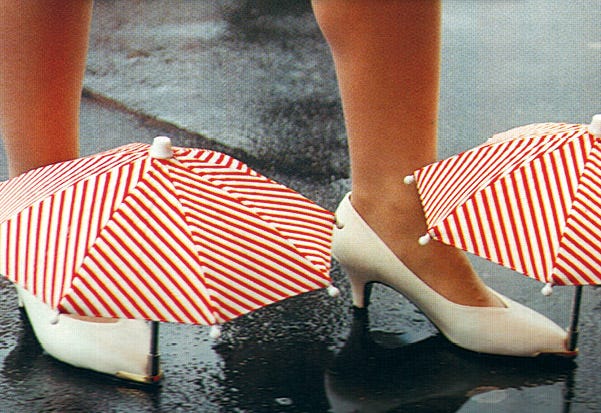Welcome to Five Slices! In every post, I share five pieces from science, history, culture, psychology, business, and art. Sign up here to get these stories in your inbox:
You can check out the complete list of stories here. Please like the post if you enjoy reading.
The philosophy of lying down
Even if a comedian can get an entire room to roll on the floor laughing, his attention is always drawn to the one person who refuses to respond. Conquerors are no different from comedians. When Alexander the Great visited Corinth for the first time, he received a warm welcome. However, his eyes were scanning the crowd for a missing face, the philosopher Diogenes. Alexander went looking for Diogenes and found him chilling in a bathtub.
“Is there any wish of yours that I can fulfill?” Alexander asked. “Yes, get out of the way. You’re blocking the sunlight,” said Diogenes.
Diogenes was famously eccentric and totally disinterested in being a productive part of society. He isn’t as famous as Socrates or Aristotle as a result.
But in 2021, a young man named Luo Huazhong shared a post on Baidu, the Chinese Search Engine:
I haven’t been working for two years, I have just been hanging around and I don’t see anything wrong with this. Pressure mainly comes from comparisons with your peers and the values of the older generation. These pressures keep popping up…But, we don’t have to abide by these (norms). I can live like Diogenes and sleep inside a wooden bucket, enjoying sunshine. I can live like Heraclitus in a cave, thinking about the “logos.” Since this land has never had a school of thought that upholds human subjectivity, I can develop one on my own. Lying down is my philosophical movement. Only through lying flat can humans become the measure of all things.
It looked like Diogenes was making a comeback. Huazhong kicked off a trend in China called Tang Ping. The word translates to “lying down” and described a movement of young people refusing to go the extra mile and instead doing the bare minimum to get by. During the pandemic and lockdowns, this trend caught on in other nations by the name “quiet quitting.” It might have been a response to the 996 hustle culture encouraged by the Chinese government (996 stands for 9 am to 9 pm, 6 days a week), or it might just have been a byproduct of the millennial generation’s frustration with its burnout.
Unlike earlier generations which seemed to believe that their contributions are making a difference to the world and that their actions count for something, millennials and their successors seem to be disillusioned with their “bullshit jobs” that seem to make no tangible difference to the system they live in.
Right now, we might be at the verge of Artificial General Intelligence (AGI) taking things even further, by automating the majority of jobs and freeing up our time. What would human life look like in a post-AGI world? What would give people purpose? It’s possible that human creativity and authentic personalities might be more valuable in a world where technical jobs are automated. It’s also possible that entirely new jobs might be coming up that we can’t even predict (roles like “UX designer,” “prompt engineer,” and “data scientist” didn’t exist a 100 years ago. Computers made them possible). If you want to learn more about this, I recommend reading Rohit Krishnan’s article What would a world with AGI look like?
The guy who gets paid for doing nothing
In the novel “The Wind-up Bird Chronicle,” Murakami writes a very odd sequence of events where the main character is paid hundreds of thousands of yen for just going to a building every day and sitting there for a few minutes. If that seems surreal, one guy made that his entire profession in real life.1
“It makes no difference whether you’re here or not.”
”I can’t tell whether you’re alive or dead.”
”You’re a permanent vacancy.”
Shoji Morimoto of Japan kept hearing things like this from his boss everyday. Instead of taking this as a personal insult, Shoji decided to leverage his strengths. He posted a Tweet saying people could hire him to “do nothing.”
He had only 300 followers at the time he posted this. Ten months later, he had 100,000. The number of requests kept growing steadily, and he got some very peculiar requests. Some people wanted to try a frappucino at Starbucks and asked if he would share the coffee with them. Others asked him to stand in a queue or share a drink with them on a park bench. Some people just wanted him to listen (he wouldn’t give any advice, and would only respond with “Hmm. I see.”). A writer once hired him to just sit nearby and watch him, so that he’d feel the pressure to start writing.
One lady asked him to just think about her. Her leave had been cancelled and she wanted Shoji to think “Is she ok?” and let her know. It’s gotten to the point where he’s getting so many requests that he’s having to reject most of them. He earns about $80,000 a year doing nothing.
Source: This article. If you want to read about a similar weird business, check out this article about Japan’s “Rent-a-family” industry on which Werner Herzog even made a movie.2
The joy of making useless things
Simone Giertz, like most people, found brushing her teeth a boring task. Instead of giving up brushing or getting an electric toothbrush, she decided to go the extra mile by doing something ridiculous. She built a robot helmet that would automatically brush her teeth for her:
She uploaded a clip of herself using this helmet, and it kickstarted a career of building useless robots just for the fun of it. Like she says in this Ted Talk, “the easiest way to be at the top of your field is to choose a very small field.”
Simone is marvelous and you should totally check out her YouTube channel. But she’s also the latest in a line of people who have been building useless things just for the heck of it. Kenji Kawakami invented the art of “Chindogu” or “unusual tools” to create whimsical objects that bring a smile to your face.
For example, a fan that cools your bowl of noodles as you’re eating:
Or umbrellas for your shoes:
Or a helmet that lets you fall asleep on the subway without falling down:
Chindogu has ten rules, e.g That the object must be real and must not have an actual use. But some chindogu inventions have failed by actually becoming useful. The selfie stick was invented as a chindogu object but thousands of selfie sticks have now been sold as useful objects.
A nice complement to the Chindogu is the Ig Nobel Prize, an annual award ceremony awarded to inventions that “first make people laugh, then make them think.” For example, Donald Unger of California cracked the knuckles on just one hand every day for 50 years to find out if it leads to arthritis in that hand (conclusion: it doesn’t). Another person in Australia patented the wheel. Yet another discovered that cows with names give more milk compared to nameless cows. I could go on and on with this stuff.
The Boredom experiment
J.R.R. Tolkien wrote The Hobbit and The Lord of the rings, and kicked off a billion dollar fictional empire with loads of books, movies, and a TV series. He invented his own language, history, poetry, family trees, and mythologies for these worlds. He drew maps and wrote letters that his characters exchanged. Yet all of this started because of one day of boredom.
Tolkien says in an interview that he was correcting exam papers in summer and found it extremely laborious and boring. Leafing through the papers, he found one student had left a complete sheet “gloriously blank.” Tolkien began to write on that blank page: “In a hole in a ground, there lived a hobbit…” and that became the first page of his first book (The student got an extra five marks). The Hobbit went on to sell more than a 100 million copies.
Boredom is essential for imagining and visualizing things. But extreme boredom can have some unusual effects on the human body. One science experiment locked voluntary participants in a white room with nothing to do and access to just food and a bathroom, for days together. After a few days, they began to see some scary things…
If you’re somebody who imagines things for a living, intentionally boring yourself out of your mind might be a good strategy to get new ideas, once in a while.
In praise of idleness
With all this talk of useless things and boredom and idleness, you might accuse me of advocating for a life of slack and leisure. You’d be right. I’m not the first guy to do it though. The economist John Maynard Keynes thought that by 2030, people would be working only 15 hours a week. The prolific mathematician and philosopher Bertrand Russell wrote an essay named “In praise of Idleness” which starts off with this line:
I was brought up on the saying “Satan finds some mischief still for idle hands to do.” Being a highly virtuous child, I believed all that I was told and acquired a conscience which has kept me working hard down to the present moment. But although my conscience has controlled my actions, my opinions have undergone a revolution.
I’m one such guy too. I wish I could slack off and idle a little, but I’ve been programmed in a way that makes it very hard for me to sit still even for five minutes. I don’t think this is a virtue. This is a problem. In his book Novelist as a vocation, Murakami argues that schools have become very good at enforcing conformity and led to a society where efficiency is divorced from conscience. He even thinks the Fukushima nuclear reactor meltdown is the endpoint of such a chain reaction:
In every age, in every society, imagination plays a crucial role. One opposite of imagination is “efficiency.” And one of the factors that drove tens of thousands of people from their homes in Fukushima was this very “efficiency.”… But even now it’s not too late. We have to establish an axis of free thought and individual ideas that can counter this short-circuited, dangerous set of values.
If “Let’s enrich children’s imagination” becomes a set goal, though, then things will go bad all over again. What I hope for from schools is simply that they do not suppress the imagination of children who are naturally imaginative. That’s enough. I want them to provide an environment in which each person’s individuality can thrive. Do that, and schools will become fuller, freer places. Simultaneously, society itself will also become a fuller, freer place.
As one novelist, those are my thoughts. Not that my thinking about this will change anything.
I’m trying something different by writing issues once in a while where all the five slices tie into a common theme or story. This issue was about boredom, idleness, and the value of things that we ignore as “useless.” Here’s a poll for you to vote on:
If you enjoyed reading this, please like and share with a friend. It helps other people discover this:
In the last post, I wrote about unique words for special feelings. You can check the complete list of issues here.
I don’t know if he read the book. He mentions other influences like Dr Kokoraya who states that people should get paid for “just being” and a professional guest named Pro-Ogorareya.
Some of the statements here turned out to be false, but it’s broadly true.










